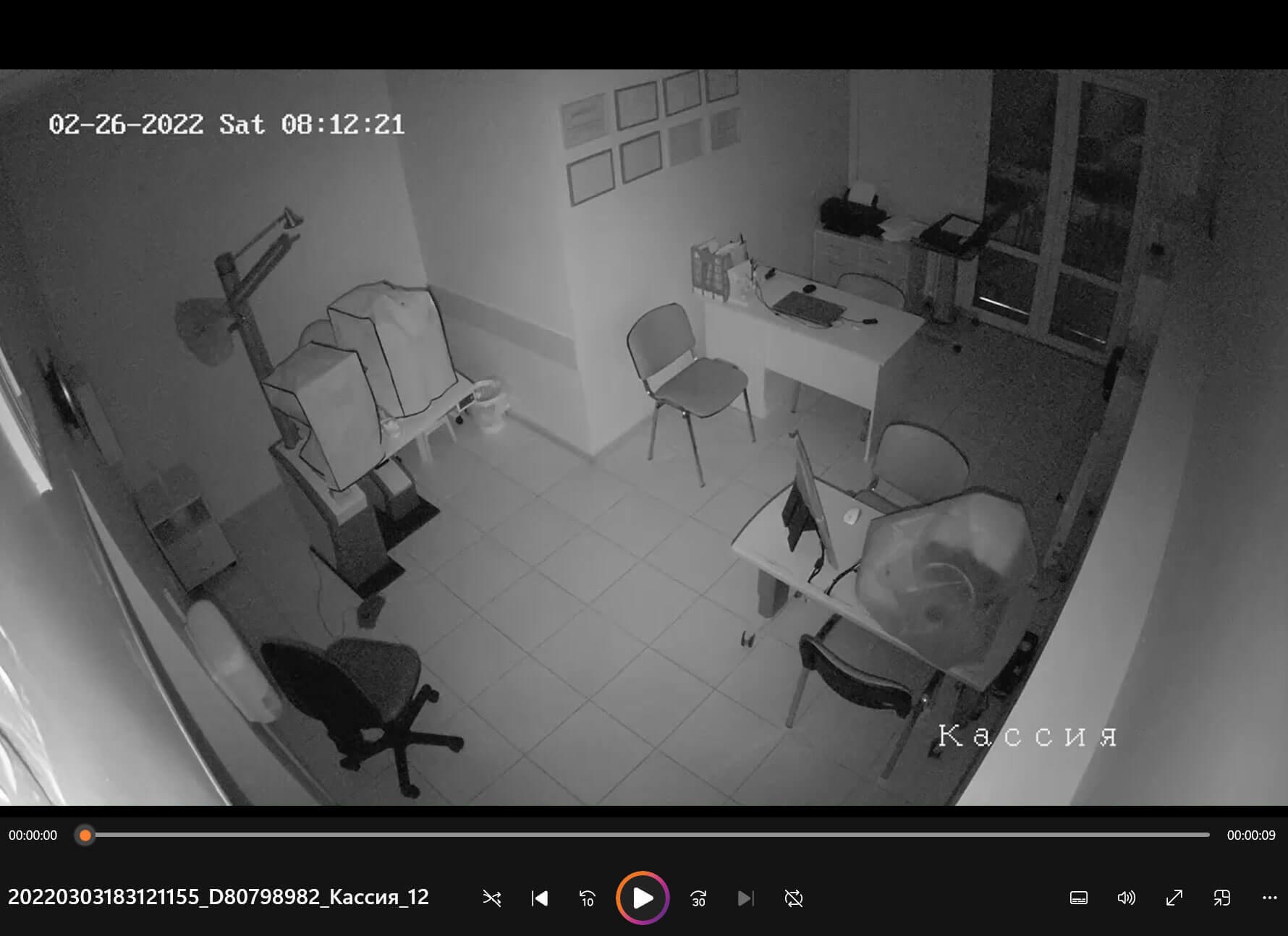It is now nine months since the full-scale Russian invasion of Ukraine commenced in late February 2022, with Putin announcing a “special military operation” to “denazify and demilitarise” Ukraine. The rest of the world, however, saw it for what it was: an unwarranted and unjustified war against a peaceful European country. It is estimated that to date the human cost of the war amounts to 200,000 soldiers and 40,000 civilian lives having been lost with extraordinary amounts of human suffering. At five months into the war, the financial cost was estimated by the C.D. Howe Institute conservatively to be $8.95 trillion US dollars, which comprises $4.25 trillion in economic costs and $4.7 trillion in human costs.
Whilst the news that reaches the UK updates us on the current military situation in the conflict, I was keen to interview an ophthalmologist working in Ukraine to find out about the impact of the war on daily life and the challenges in practising ophthalmology in what is effectively a war zone. Dr Volodymyr Melnyk honoured UKISCRS (United Kingdom & Ireland Society of Cataract & Refractive Surgeons) delegates in the October 2022 annual congress by presenting a video on the status of ophthalmology and the effects the war has had upon it. Invited to join the faculty by UKISCRS president, Mr Paul Ursell, Dr Melnyk brought a human touch to the expert video panel and so I asked if I could obtain details to interview him, which UKISCRS, via their manager Gill Wood and Linda Kelly from Eye News, were more than happy to organise.
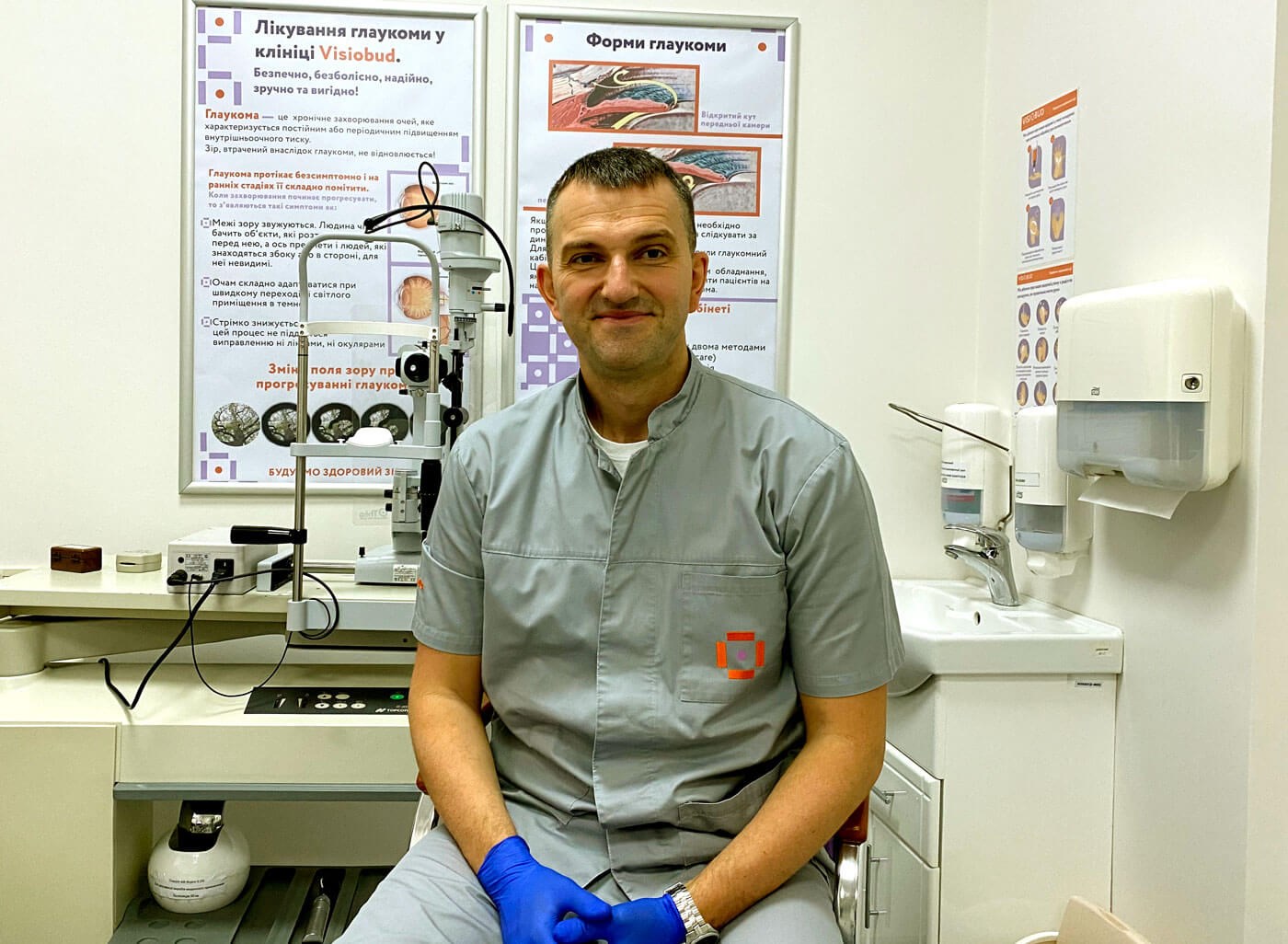
Dr Volodymyr Melnyk.
Dr Melnyk is a cataract and anterior segment (cornea and glaucoma) surgeon working in Kyiv. He is head of the Society of Ukrainian Ophthalmic Surgeons and founder and chief doctor of clinic "Visiobud". We meet early on a Sunday morning in late November via Zoom, with Volodymyr located in his office in Kyiv.
My first question to Volodymyr is if he ever expected the invasion to happen back in February. He replies:
“We heard that Russian army forces were around the Ukrainian borders, but we couldn’t believe that this war would start. This is because we understood that Ukraine and Russia are the two largest countries on the European continent, and for these two countries to start an aggressive war in the 21st century had to be nonsense and impossible.”
Volodymyr explains that at the time just before war broke out, he had been busy preparing the programme and activities for the Ukrainian National Ophthalmic Surgeons Congress commencing on 4 March, inviting many people from around Europe to attend. The decision was then taken to change the meeting to virtual because travel was restricted, with limited flights to Ukraine. Ultimately, as events panned out, the congress was cancelled because of the Russian invasion on the morning of Thursday, 24 February, 2022.
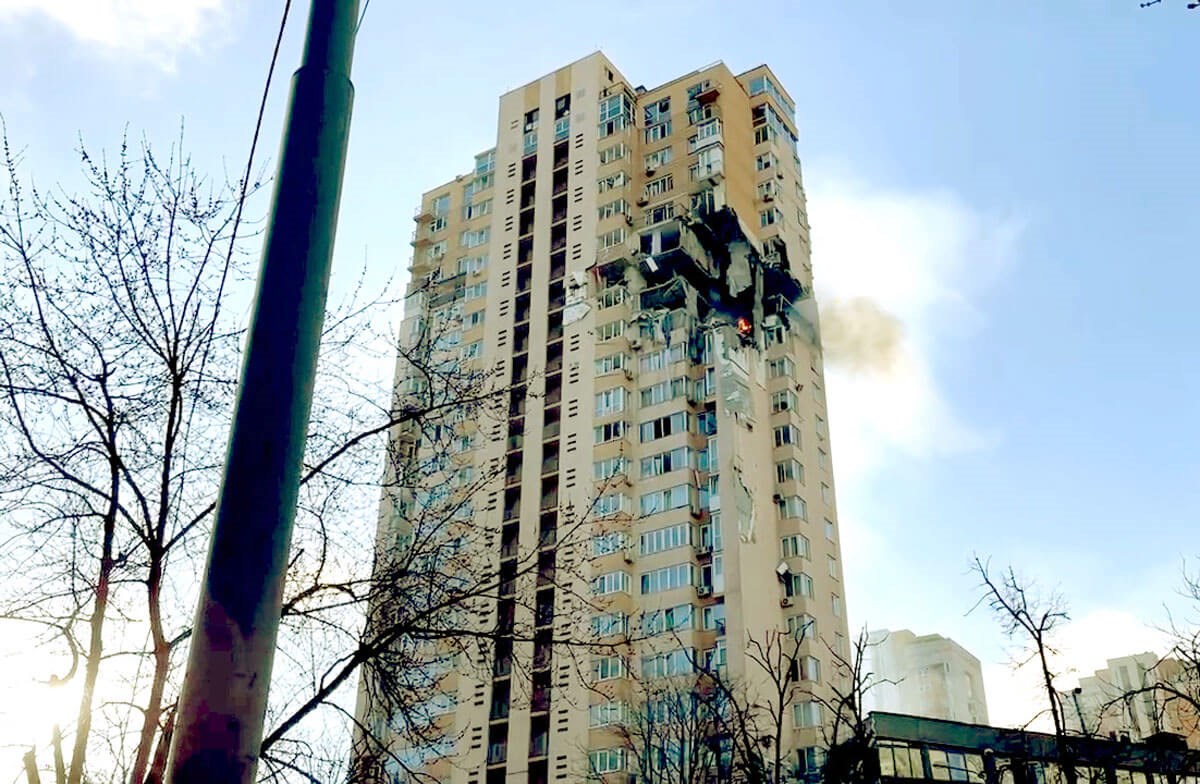
Missile attack on building adjacent to Clinic Visiobud, 26 February 2022.
I ask Volodymyr to describe the events of that day. “Before this day, I continued with my work, organising the conference, and performing my surgeries, but I didn’t think about the possibility of this war. On the evening of Wednesday 23 February, my wife came to me and asked what my opinion about the situation was and I told her that I didn’t believe that a war could start. However, we had an agreement that we would prepare luggage with our documents in advance so that if anything should happen, we would leave with our two boys, aged 15 and 6, to stay with my mother-in-law living in a small village 100km south of Kyiv.”
He continues: “I was woken up at 5:00am on 24 February to the sound of explosions and alarms going off throughout Kyiv. In 10 or 15 minutes we got our luggage and left by car for my mother-in-law’s.”
Volodymyr and his family lived with his mother-in-law for 10 days and then they decided to travel to the western side of Ukraine, to Ivano-Frankivsk. In this city Volodymyr also has a practice where he normally goes once per month to operate on patients. He stayed there continuing his ophthalmology work whilst his family left for Slovakia. In May, they all returned to Kyiv and he reopened his clinic. For the two months whilst they were away the Russian army was very close to Kyiv, and because space was in demand, his clinic was used as a base for the Kyiv Territorial Army Defence.
Explosion wave opening doors at Clinic Visiobud, 26 February 2022. (CLICK IMAGE TO SEE FOOTAGE)
I ask how he feels about safety in Kyiv, especially with the renewed missile attacks by Russia on Ukrainian cities following the liberation of Kherson. He explains: “If you compare Kyiv with the Eastern Luhansk or Donetsk regions where the battle line is, then Kyiv is much safer. But there is no safe place in Ukraine now. For example, in the last week we had two missile attacks on Kyiv. On Tuesday 15 November, it was my operation day, and it was the biggest missile attack since the start of this war. But around Kyiv we count on our missile defences to protect us, and Kyiv is now one of the saftest places in Ukraine. Other cities like Lviv in the west are really suffering from missile attacks.”
Away from the front lines, Volodymyr explains that the problems not only stem from missile attacks but blackouts from disruption to energy supplies. There are regular blackouts in Kyiv, two or three times per day, each lasting three to four hours. There were severe disruptions to the energy supplies with the missile attacks on 10 October, when over 80 rockets were fired at different parts of Ukraine. I ask if he has generators for his clinic so that he could continue to operate on patients during a blackout. “I actually began to prepare for this situation since 2014 when this war started and I bought generators for our operating theatre,” he explains. “During a blackout we can continue working in the operating theatre and carry on with surgery.”
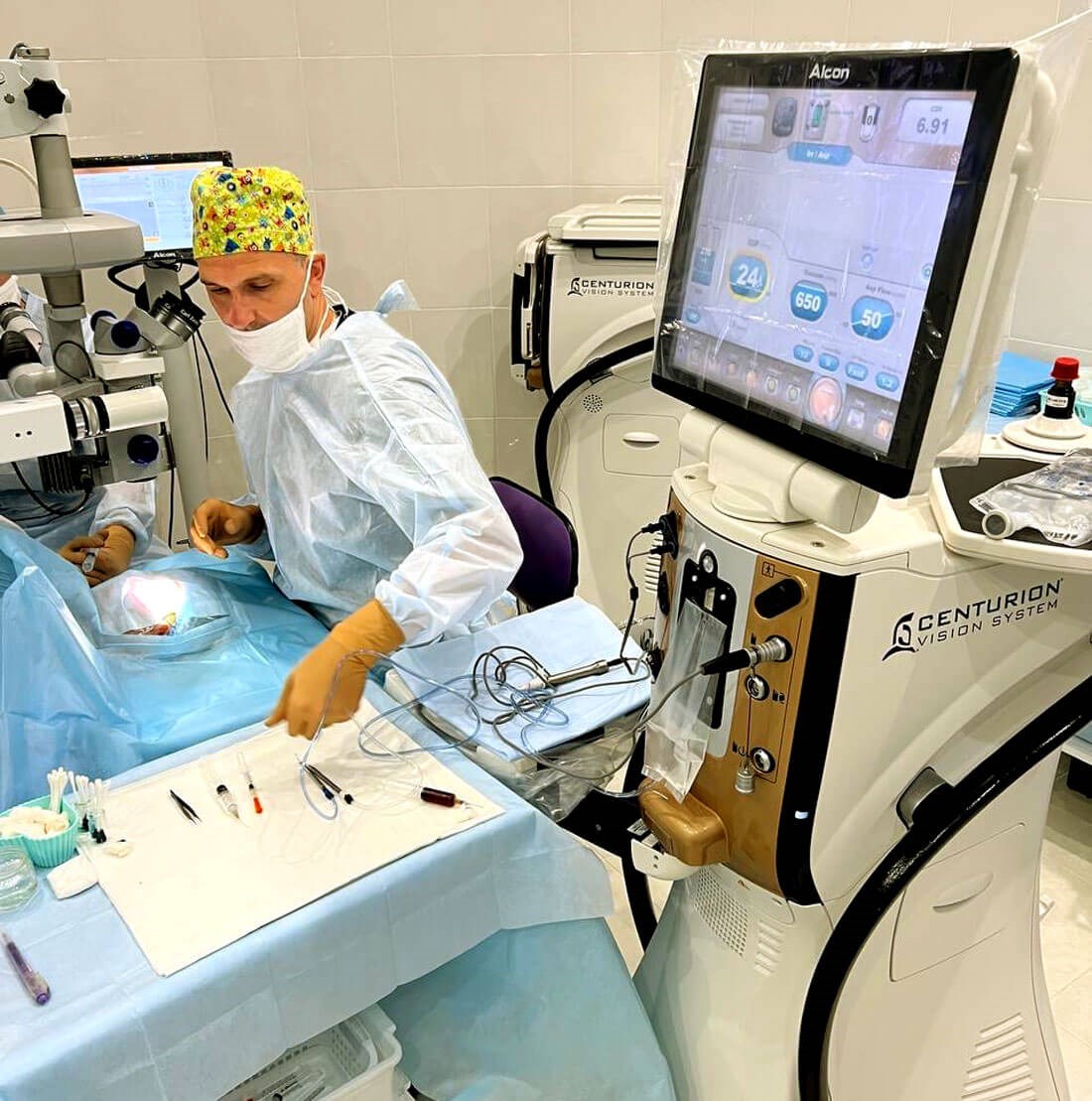
Clinic Visiobud operating theatre without windows.
Volodymyr tells me that initially at the start of the war there were problems with supplies, but he reassures me that now they usually have all the medical equipment and material that they require for surgery with the distributors of all the biggest companies including amongst others, Alcon, Bausch & Lomb and Johnson & Johnson continuing to operate in Ukraine.
However, there are odd occasions when supply is interrupted, and they cannot get products like phacoemulsification cassettes or viscoelastics. There are also a few products that cannot be obtained at present in Ukraine. One of these is Ahmed valves for glaucoma surgery. Volodymyr explains: “We cannot buy these devices in Ukraine because the company which distributed these devices was connected with Russia, so they no longer work in Ukraine. We have requested these from the European Society of Cataract and Refractive Surgeons who are providing them as humanitarian aid, and we should receive these Ahmed valves next week.”
Volodymyr has also been instrumental in co-ordinating the ophthalmic humanitarian effort in Ukraine. This year, the Society of Ukrainian Ophthalmic Surgeons has already distributed over $2 million US dollars’ worth of ophthalmology humanitarian goods to a network of approximately 65 to 70 hospitals throughout Ukraine, mainly military and large public hospitals. Most of this humanitarian aid has been provided by Novartis, but other companies have helped too. In the last week, Kherson has been liberated, and Volodymyr is now arranging for humanitarian aid including eye drops, anti-VEGF, and other medications to be supplied to Kherson Regional Hospital Ophthalmic department, where work has recommenced.
Through this distribution of aid, the 65 to 70 hospitals in the network have been able to continue working, many of which are in very dangerous regions such as Zaporizhzhia, Kherson and Kharkiv. He informs me that “ophthalmologists are now working throughout Ukraine and every patient with different eye problems can get ophthalmic care very close to his location.”
With the ongoing war and many casualties, I ask about how the ocular trauma is being managed. He explains that the majority of eye trauma from the military combatants is being treated at the major military hospitals with ophthalmic departments at Odessa, Dnipro and Kharkiv. However, he is usually faced with treating the freed military prisoners of war, for example those captured in Azov, who were released by Russia in an exchange and came to Kyiv, many of whom had eye trauma or other eye diseases. Since restarting work, he has operated on more than 30 Ukrainian soldiers with trauma, cataract, or glaucoma free of charge, totalling more than two million hryvnia (approximately $50,000 US dollars), and sees it as his duty to help these people. One manufacturer has also given assistance in the treatment of soldiers and has provided intraocular lenses for free to all military personnel. This has included new technology that he believes is the best choice of lens for soldiers, as they are mostly young and need good distance and intermediate vision for targeting automatic rifles.
Volodymyr’s clinic has over 50 staff including 16 ophthalmologists. Half of his staff have remained in Kyiv throughout the war and the other half moved to western Ukraine or out of the country elsewhere in Europe. Ninety percent of his staff have now returned, and his clinic is back to around 80% capacity. “People are still coming to the clinic and want surgery to keep their vision,” he informs me.
With missiles still falling throughout Ukraine and on his own city of Kyiv, I ask what he and his family do to take their minds off the war. “We look on this situation as a chance to spend time with our families and children, to talk with them and play games in our houses. Sure, life is worse than it was before the war, but for me it is a good chance to strengthen the family and make it closer.”
Volodymyr also reassures me that the large supermarkets usually remain open, even during blackouts, as they have generators, and people can buy all necessary foods there without any problems: “We don’t have such variety of foods now, but we generally have a possibility to buy all that we need.”
I ask him what he feels the outcome of the war will be. “Look, this war started in 2014 when Putin occupied Crimea and the Donbas region,” he replies. “Despite the Minsk agreements with Putin, eight years later this war restarted, and the aggression increased. If we compromise again now it will not be the end of this war. We have to have an agreement with Russia over what is Ukrainian country, Ukrainian border, and Ukrainian safety, but we do not have any answers, and only hear that Ukraine must be demilitarised and denazified, which is crazy. Everything depends on how long Putin and his army can continue this war. We hear that Putin’s army is becoming more and more exhausted, and we believe that the Ukrainian military and all the democratic countries that are supporting us will clean the Ukrainian territory from foreign military forces.”
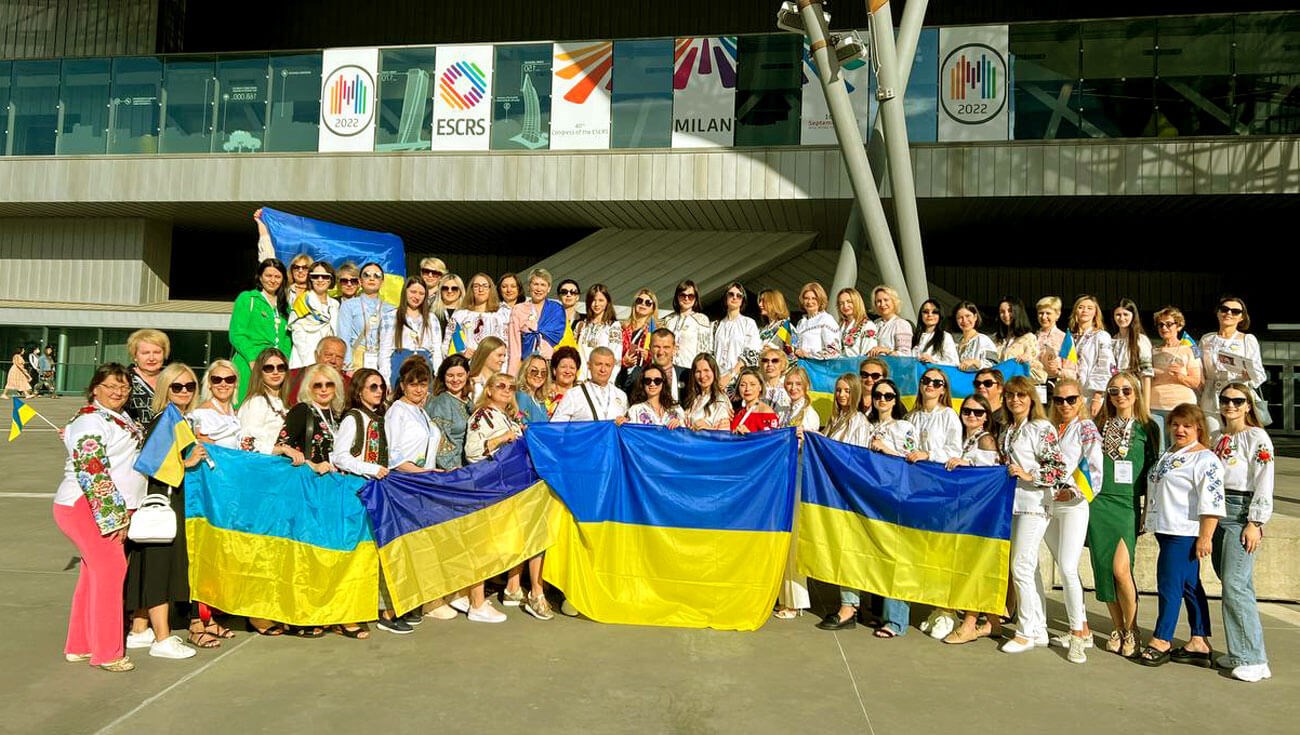
The delegation of the Society of Ukrainian Ophthalmic Surgeons at the ECSRS Congress in Milan, September 2022.
Volodymyr continues: “We have only one chance to finish this war. All the Ukrainian people are suffering a lot, but we understand that we are fighting for our peace, for our country and for our independence. We are all in danger, we don’t have time to do our activities or go on vacation, but all people in Ukraine are united in their wish to win. If you look at the last three to four centuries, Ukraine has suffered from Russian military aggression, time and again. For example, my grandfather was a political prisoner and died in prison under the Soviet Union. We see this war as a chance to really become free and independent from Russia.”
I ask Volodymyr if he has a message for the people of Europe. He replies:
“The main message is that I understand that this war touches all European countries: families, economies, energy supplies. We have to be both together and patient. Only patience can give us the possibility to win in this war. Ukraine is a possibility for the whole world to limit this war only to Ukrainian territory. Your support of Ukraine and Ukrainians is that you not only help us, but you also help yourself. Be patient and I am sure we will get a peaceful Ukraine, a peaceful European continent, and a peaceful world.”
Volodymyr also has a message for Ukrainian citizens who are no longer staying in Ukraine: “I know that all Ukrainian people, they want to come back. We all love Ukraine and our cities, and I want to say: don’t lose the optimistic wish to come back, and I am sure and I am confident you will return in a very short time.”
To sign off, I ask him if he remains positive despite this war. He replies:
“Initially, we had acute stress living in this situation, but this acute stress has changed to chronic stress. But I tell my family that day after day, week after week, month after month, winter will finish, sure we will win, we will be alive, we will be happy, and we will be free.”
Ophthalmic Aid to Eastern Europe are still seeking donations of new or ‘used but usable’ ophthalmic equipment for Ukraine. If you have anything that may be of use, please contact Mr Peter Cackett by email at pdcackett@hotmail.com . Thank you for any support that you can provide.
COMMENTS ARE WELCOME

